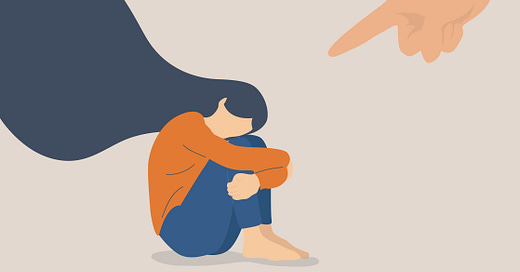You are reading Ask The Patient by Dr. Zed Zha, a doctor’s love letter that gives patients their voices back. If you enjoy it, please comment, like, share, and/or subscribe!
The content of this newsletter is included in my upcoming book, Consented: A Doctor's Call to End Medical Violence and Reclaim Patient Autonomy. Subscribe for book perks and updates!
I recognize a gaslit patient when I see one.
“Can I see your sores?” I asked Ruth, the 34-year-old Latina woman sitting across from me.
She raised her arms slowly, wincing in pain. When she pointed to the raw, weeping lesion under her right arm, I couldn’t help but gasp: “Oh my goodness, Ruth. This looks incredibly painful.”
Tears slid down her cheeks. “I know it’s cuz I’m fat, but…” Ruth kept her head down.
“But it’s not,” I said, gently cutting in, sensing she didn’t know how to finish her sentence. “What you have is called hidradenitis suppurativa, HS, and it happens to bodies of all sizes.”
HS is a chronic, recurrent inflammatory condition with painful, deep-seated sores in the hidden areas of the body. The lesions often drain pus-like fluid, and if untreated, can form deep tunnels under the skin. Up to 4% of the population may be affected by HS, which is twice as many people as there are redheads. And everyone knows a redhead. Yet, at 34, Ruth had struggled for over 20 years with HS without receiving a diagnosis.
20 years of not knowing, of waiting, and of being blamed for her illness.
Sadly, that’s a common story. A significant delay in the HS diagnosis is typical, especially for people of color. In these decades, patients like Ruth are repeatedly given the same prescription for every symptom: “Just lose weight.”
Here is the maddening bit: without even knowing the exact diagnosis, how can so many doctors be so confident in prescribing (the wrong) treatments? Isn’t that an oxymoron?
I think it’s time we spoke the truth. As I’ve pointed out in my previous posts, Anti-Fatness is Bad Medicine, and in my two-part collaboration with fathlete and size acceptance activist
on Weight and Inflammation, weight is too often the beginning and the end of the patient blame game.Patient Blaming
Patient blaming is the harmful and unjust practice of holding patients responsible for their health struggles, chronic conditions, complications, or even treatment failures.
Here is the biggest problem I have with it:
Patient blaming erases the broader social, economic, and environmental forces that shape health. And it perpetuates systemic violence such as racism, ableism, misogyny, weight bias, anti-LGBTQ+ bias, historic and ongoing oppression, and more, all under the guise of “personal responsibility.”
At its core, patient blaming says, “You made yourself sick.”
And you’ve seen the labels:
Can’t take medications as prescribed due to conflicting instructions or debilitating side effects? Noncompliant.
Missed your appointment because you were too sick to get out of bed or couldn’t find transportation? Clearly, you don’t prioritize your health.
Living with unbearable 10/10 pain? Visiting the ER repeatedly because the system keeps failing you? Drug-seeking.
Experiencing symptoms not yet understood by science? Unsatisfied with your care? Stop being difficult.
And if you push back against these labels? Well then, patients lie.
Cringe-worthy.
And completely untrue.
Here are the facts:
Medications are often too expensive, too complicated, and too riddled with side effects. People aren’t noncompliant. The medical system is too inflexible and unforgiving.
Life is messy. People have jobs, caregiving duties, disabilities, and crises. Sometimes, there are things more urgent than a doctor’s visit. People take their health seriously. And we don’t always need to be at the center of their lives. I know. Try not to be too heartbroken.
Pain is not a number. That said, yes, people do have 10/10 pain. And they come to the ER, as they should. Similarly, those who have the most unmet social needs (housing, food, transportation, etc) tend to utilize the ER more. Because people don’t seek drugs. They seek help.
Who gets labeled “difficult”? Women. People of color. Fat people. Disabled people. Trans people. Poor people. Older adults. Those with multiple symptoms, mental health distress, or complex needs. These patients aren’t difficult; they exist outside of our comfort zones.
And yes, 60–80% of patients do lie to their doctors. Why? 1/3 pretend to agree with the medical advice. Another third pretend to understand instructions..All of them are trying to avoid moral judgment.
Let’s pause and take that in: patients lie to escape the labels of noncompliant, difficult, drug-seeking, dramatic, self-sabotaging, lying, etc.
So here’s the real question:
Do patients lie? Or do we create a culture where honesty feels unsafe?
And more urgently, have we flipped the truth on its head so many times that we’ve forgotten what it even sounds like?
Medical Gaslighting
“I know it’s cuz I’m fat, but…” Ruth said. Notice that she didn’t say “they say it’s cuz I’m fat,” she said, “I know.”
Like so many living with HS, Ruth had not only internalized the lie that her body caused her suffering, but she had also learned to blame herself for failing to shrink it into health and into worthiness.
When we blame patients often enough and for long enough, we make them believe they deserve to be sick. And that’s how patient-blaming mutates into medical gaslighting: the systematic invalidation of a patient’s reality until they question their own experiences.
The term “gaslighting” comes from the 1938 British play Gas Light, later adapted into films in 1944. In the movie, a husband manipulates his wife into thinking she is going insane by repeatedly dimming the gas lights in the house and denying that the lights had changed at all. Gradually, she starts to doubt her own perception, memory, and eventually, sanity.
The term medical gaslighting was first publicly used in 2020 by a patient with long COVID, who described how doctors brushed off her symptoms as “just anxiety.” Since then, the term has been used widely to mean symptom dismissal. But like the original story, gaslighting implies something darker: a flipping of reality.
Take Ruth, offering up her weight to blame before I said anything. Or think endometriosis: generations of patients have been told their symptoms were “normal period pain” until they no longer trust their bodies.
In other words, medical gaslighting goes beyond dismissal and invalidation. It turns the “done to” into the “doer,” and the blamed into the blamer. And when the blame shifts, the harm disappears from view.
And here is the full circle of medical gaslighting: by labeling a patient a liar, we make a liar of them. By dismissing their pain, we prolong their suffering. By blaming them for being sick, we make them sicker.
Somewhere in this dimming light, we lose patients as help seekers, and we lose ourselves as help providers.
What can we do?
In a recent podcast episode, Ask the Patient: Why Medicine Still Doesn't Listen, on LONG COVID, MD with
, Zeest asked me what advice I had for patients to advocate for themselves.“I think patients have done enough self-advocating,” I said, “being listened to should be the default, not something people have to fight for. It’s time we met them halfway.”
It’s true. Zeest and I both firmly believe that.
People in the chronic illness and disability communities have been telling us this for years. In her powerful recent post, My Most Dangerous ER Experience and How My Advocate Saved My Life,
makes that truth unmistakably clear.The advice should be for ourselves, not our patients. A few days ago, in an interview with a journalist for Medscape Medical News on the topic of medical gaslighting, I shared my advice for clinicians:
Remember the person you were when you applied for medical school? The one who believed in bodily autonomy, who cared about equity and racial justice, who knew that every body, in every shape and form, is worthy of care? Hold on to that, and don’t let medicine train it out of you.
Believe the patient the FIRST time they say they are in pain. Know that you are smart, yes, but also remember: you are not the expert in the patient’s body. They are. And if you ever find yourself choosing between the textbook and the person in front of you, choose the person.
Ask yourself, every encounter: Would I be doing the same thing if this patient were an able-bodied, thin, cisgender, straight white man? If they spoke without an accent? And if they looked like me? And if the answer is anything but a confident “yes!”, good, that means your real work of unlearning begins now.
After receiving the correct diagnosis and treatments, Ruth is doing so much better. She has also joined me in the fight to dismantle patient blaming and medical gaslighting for patients with HS through a support group.
In this group, Ruth’s voice is louder than mine. As it should be.
Recently, she told me that she overheard someone she knew talk about sores in armpits and groin areas and how their doctor dismissed them with, “Go lose weight.”
“Having HS isn’t your fault,” Ruth stepped in gently (with her signature warm smile, I imagine). “And it sounds like your doctor could learn more about it.”
She’s right.
We could all stand to learn more.
Anesthesiologist and activist
and I are having a live discussion soon about medical trauma and medical gaslighting on her page Poppies and Propofol. If you are looking to have hope that many of us within medicine are calling out the harmful culture of our very own profession, watch this space, come and join us! Also, check out her recent discussion with Dr. on the call for academic freedom.





At times I’ve become so disillusioned and frustrated by doctors who don’t listen and don’t believe me that I’ve wondered whether I should stop going to the doctor.
I had an ER doctor tell me that maybe I misremembered my hysterectomy, that maybe I’d *really* had kidney stones or a bladder infection instead.
This resulted in him administering a pregnancy test using reserved blood without my consent after I’d refused a urine test multiple times. And he didn’t understand my anger — or why I would accuse him of not believing me (he said “women just don’t know what happens to their bodies”).
At some point in the conversation he also asked me what I did for a living and how much education I had, as if my memory depended on whether I’d graduated from college.
(BTW, I was in the ER for a finger infection.)
Agree. Been hurt by modern medicine too many times to think practicing being a defensive patient isn't necessary.
Last time i was hospitalized for 6 days because prescribed bp drug, hydralazine, gifted me with acute hepatitis. Doctors insisted i had malaria because i had been in South Africa in a coastal area where malaria is NOT ENDEMIC.
I had to beg doctors to read PDR for the drug carries acute hepatitus as an adverse reaction. So..
As my multiple malaria blood draws all had negative results, and my liver values rose near my 700s, i was forced to BEG them to read PDR. I almost died